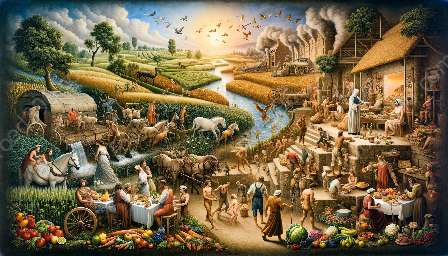In today's rapidly changing world, modern food production faces a multitude of challenges, from the need to feed a growing global population to environmental concerns and evolving consumer preferences. This article will delve into the complexities of modern food production, examining the historical developments in agriculture, the impact on food culture, and the innovative solutions being developed to address these challenges.
Historical Developments in Food Production and Agriculture
Agricultural Revolution: The history of food production and agriculture is intrinsically linked to human development. The dawn of agriculture marked a significant shift from hunter-gatherer societies to settled agricultural communities, leading to the production of surplus food and the rise of civilizations.
Industrial Revolution: The Industrial Revolution brought about mechanization and increased productivity in agriculture, transforming the way food was produced and distributed. This period laid the foundation for modern farming practices and the mass production of food.
Green Revolution: In the mid-20th century, advancements in agricultural science and technology led to increased crop yields through the use of high-yield varieties, chemical fertilizers, and pesticides. The Green Revolution played a crucial role in meeting the food demands of a growing global population.
Technological Advancements: With the advent of technology, modern food production has seen significant advancements in precision agriculture, automation, and biotechnology. These innovations have revolutionized farming practices, leading to increased efficiency and sustainability.
Impact on Food Culture and History
Changing Diets: As food production methods evolved, so did the diets of people around the world. The availability of diverse food options and the globalization of food trade have significantly influenced culinary traditions and food consumption patterns.
Environmental Concerns: The expansion of modern agriculture has raised environmental concerns, including deforestation, soil degradation, water pollution, and greenhouse gas emissions. These challenges have prompted a reevaluation of agricultural practices to minimize environmental impact.
Food Security: While advancements in food production have helped alleviate hunger in many regions, the issue of food security remains a pressing global concern. Access to nutritious and affordable food continues to be a major challenge, particularly in developing countries.
Cultural Preservation: The shift towards modern food production has also posed challenges to the preservation of traditional farming methods and indigenous food cultures. Efforts to sustain heritage crops and traditional food practices are crucial to maintaining cultural diversity and culinary heritage.
Modern Challenges in Food Production
Population Growth: The ever-increasing global population poses a fundamental challenge to modern food production. Balancing the supply of food with the growing demand requires innovative approaches to enhance agricultural productivity and food distribution.
Resource Scarcity: Depleting natural resources, such as water and arable land, present significant obstacles to sustainable food production. Integrated resource management and conservation practices are essential to mitigate the impact of resource scarcity.
Climate Change: Changing climatic conditions directly affect agricultural productivity, leading to crop failures, shifts in growing seasons, and increased pest and disease pressure. Adapting to climate change through resilient agricultural practices is imperative for long-term food security.
Food Waste: The inefficiencies in the food supply chain contribute to substantial food waste, from post-harvest losses to consumer food disposal. Addressing food waste through improved storage, transportation, and consumption habits is crucial for maximizing food production efficiency.
Sustainable Solutions for Modern Food Production
Regenerative Agriculture: Regenerative farming practices aim to restore and enhance the health of the ecosystem, promoting soil health, biodiversity, and carbon sequestration. Practices such as crop rotation, cover cropping, and agroforestry contribute to sustainable food production.
Precision Farming: Utilizing data-driven technologies, precision farming enables farmers to optimize input usage, reduce environmental impact, and enhance crop productivity. Tools such as GPS-guided machinery and remote sensing support precise decision-making in farming operations.
Urban Agriculture: Urban farming initiatives bring food production closer to urban centers, utilizing rooftops, vertical gardens, and vacant lots to cultivate fresh produce. This localized approach to food production contributes to food security, community engagement, and reduced transportation emissions.
Alternative Proteins: The development of alternative protein sources, such as plant-based proteins and cultured meat, offers sustainable alternatives to traditional livestock production. Innovations in food technology are revolutionizing protein production to address environmental and ethical concerns.
Consumer Education: Empowering consumers with knowledge about sustainable food choices and responsible consumption practices plays a critical role in shaping the future of food production. Promoting food literacy and conscious eating habits fosters a more sustainable food system.
Conclusion
In conclusion, the challenges in modern food production are multifaceted, encompassing environmental, social, and economic dimensions. However, by embracing innovative solutions and drawing inspiration from historical agricultural developments, we can create a more sustainable and resilient food system. Understanding the historical context of food production and its cultural significance provides valuable insights for addressing the complexities of modern food challenges. By cultivating a deeper appreciation for the interconnectedness of food culture, history, and production, we can work towards a more sustainable and inclusive global food ecosystem.

